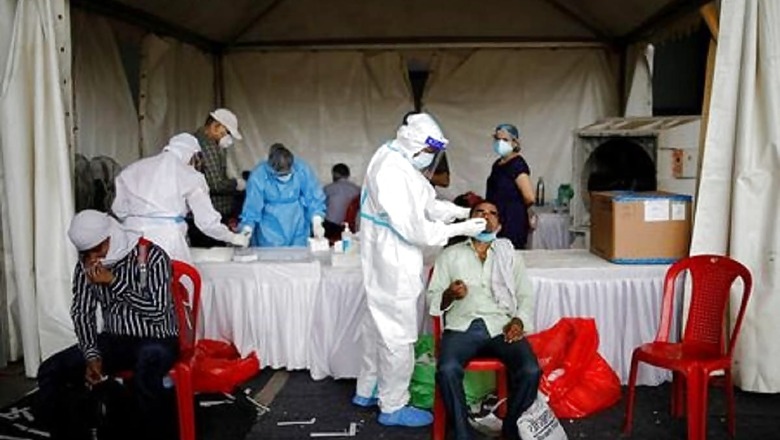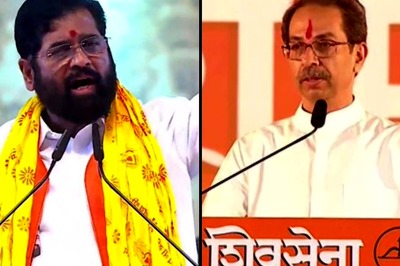
views
From suggestions on creation of the ‘Indian Health Service’ (IHS) in streamlining the public healthcare system to increase in investment for the development of heath sector, the Parliamentary Panel on Health, in its 123rd report, has listed out a series of measures that the government should take in dealing with the Covid-19 pandemic. The report has been submitted to Rajya Sabha Chairman.
INADEQUATE NUMBER OF BEDS
Highlighting the grossly inadequate number of hospital beds in the government hospitals, the Committee noted that “lack of hospital beds and the inadequate ventilators facilities further complicated the efficacy of the containment plan against the pandemic. As the numbers of cases were on the rise, a frantic search for vacant hospital beds became quite harrowing. Instances of patients being turned away from over-burdened hospitals due to lack of vacant beds became the new normal. Aggrieving at the poor state of healthcare system, the Committee recommends for increasing investment in public health infrastructure.”
‘NPPA TO REGULATE PRICES OF OXYGEN’
Expressing concerns over the instances of lack of oxygen cylinders in the hospitals and increase in the demand of non-invasive oxygen cylinders, the Committee has suggested that the National Pharmaceutical Pricing Authority should take appropriate measures for capping the price of the oxygen cylinders so that the availability as well as affordability of the oxygen cylinders is ensured in all hospitals for medical consumption.
RAT Vs RT-PCR
Noting the use of less reliable diagnostic tests, the Committee recommended for increase in testing through reliable RT-PCR tests. The suggestions also are to encourage domestic medical device manufacturing industry, the Committee recommends the government to boost investment and innovation in the medical device industry in the country.
INDIAN HEALTH SERVICE NEEDED
Highlighting the lack of relevant skills required for epidemic outbreak investigation among the healthcare workers, the Committee recommends for urgent need for capacity building and maintaining the pool of health resources to fight against the outbreak of the pandemic. The Committee strongly supports the demand for the ‘Indian Health Service’ (IHS) in the Center and across states as a dedicated, efficient, and adequately resourced public health cadre on the pattern of Indian Administrative Service (IAS).
‘INCREASE THE NUMBER OF EPIDIMIOLOGISTS IN INDIA’
Recognising the crucial role of epidemiologists in underlying the distribution of disease and the strategy for its control, the Committee says, “better trained health workers in epidemiology are fundamental for a robust surveillance system.” The Committee has also asked the government to set the target of one trained field epidemiologist per 200,000 population. “India, being a member of GHSA, should positively work on capacity building of the frontline epidemiology workforce,” says the report.
‘MEDICAL STAFF SHOULD NOT FACE SHORTAGE OF PPE’
The Committee has also noted that the healthcare workers in the beginning of the pandemic had to work under huge stress due to shortage of PPE kits amidst impending threat of coronavirus infection as a result quite many of them had to lose their precious lives. The Committee pays tribute to the doctors and nurses who have sacrificed their lives while combating Covid-19. The Ministry needs to ensure that there is no shortage of personal protective equipment (PPE) kits.
FOCUS ON RURAL INDIA
The Committee feels that adequate primary and secondary healthcare infrastructure needs to be put in place especially in the rural areas by increasing requisite investment on physical infrastructure. The Ministry should also increase the number of VRDLs across different states so that testing capacity in the country is upgraded manifold. The Committee also strongly recommends that every state should establish at least one medical college and hospital.
The Committee has also asked the Union Health Ministry to issue clear guidelines on facilities for teleconsultation and encourage the participation of the public through various awareness and outreach programs. “Panchayat and community leaders needs to be actively involved for dissemination of information regarding hand washing, physical distancing and use of masks.”
‘BE TRANSPARENT WHEN IT COMES TO VACCINES’
Understanding the urgency among the global scientific community for development of a vaccine against Covid-19, the Committee strongly emphasizes on the need for ensuring highest level of ethical and procedural standards in the vaccine research studies. “The vaccine should pass the strictly regulated route of all phases of clinical trials and the data should be made available in the public domain.” The Committee has recommended the Ministry to follow a transparent approach so that any irregularity in the approval/production of vaccine is avoided.
Urging the Health Ministry to devise a plan for the availability of the vaccine, the Committee recommends to collaborate with Serum Institute of India (SII) and other vaccine manufacturers so that vaccines are easily available at an affordable rate to the general public. The Committee calls upon the Ministry to subsidize the vaccine cost for the weaker section of the country and especially in rural areas or the urban slum areas. The Ministry should be cautious in its efforts to check instances of black-marketing and shortage of vaccines. The Committee also recommends the Ministry to administer the vaccines according to the WHO’s “strategic allocation” approach or a multi-tiered risk-based approach.
VACCINATE EVERYONE, SUBSIDIZE VACCINES
The Committee is of the view that smart vaccination may be used as an immediate strategy but subsequently the whole population should be vaccinated. The Committee also recommends the Ministry to upgrade its cold-chain storage system so that country wide vaccination can be carried out without any hurdles.
‘TESTING IS STILL LIMITED’
While appreciating the government’s efforts in ramping up testing facilities, the parliamentary committee says that testing facility is only limited to bigger districts and cities. Lack of testing facilities in rural areas has also resulted in underreporting of cases and that this problem needs to be addressed.
Among other suggestions are on strengthening cooperation between center and states, increase in budgetary allocation to the Indian Council of Medical Research (ICMR) to broaden its research activities, and higher investment in R&D.
“The Committee deprecates the fact that India’s lower appropriation on Research speaks volumes of how neglected the R&D sector has been in the country. The Committee, therefore, strongly recommends that the Ministry should at least increase its spending on research to the world average of 1.72 as a percentage of GDP within two years. The Committee also recommends the Ministry to set specific expenditure targets for R&D and for promotion of science, technology and innovation (STI). This dedicated separate budgetary allocation should be supported even in financial crisis situations so that research activities do not suffer in the wake of any unforeseen circumstances.”
It has also asked the Ministry to minimize the out of pocket expenditure of patients due to COVID 19 while not neglect other healthcare services. “The Committee, therefore, recommends the Ministry to also ensure that basic healthcare services like immunization, maternal, neonatal healthcare facilities, health check-ups, screenings etc are not disrupted in the Health and Wellness Centres.”
‘SET UP POST RECOVERY CLINICS AND STUDY RE-INFECTIONS’
The report also suggests that the government address the possibility of SARS-CoV-2 re-infection, the proportion of adverse reactions after hospital discharge and the possible development of other viral and/or bacterial infections Committee recommends the Ministry to set up post-COVID clinics, on the lines of AIIMS Delhi, to look after the recovered patients who are facing post COVID 19 issues.
INVEST IN HEALTHCARE AND MANPOWER
The committee has also recommended filling up of vacant posts of healthcare workers on an urgent basis, invest in mental health services and increase spending on healthcare.” his lack of investment in the health infrastructure has exposed the fragility of Indian health ecosystem which posed a big hurdle in generating an effective response against the pandemic.” it says. It also asks for addressing the grievances of healthcare workers and boost their morale. The pandemic offers an opportunity to revisit the country’s health policy suggests the panel, seeking higher budgetary allocation.
Read all the Latest News, Breaking News and Coronavirus News here




















Comments
0 comment